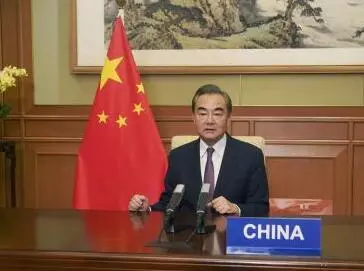China has mounted a fresh diplomatic offensive among neighbouring South-east Asian countries to counter US influence in the region and the growing Indo-Pacific Quad initiative.
“Chinese State Councillor and Foreign Minister Wang Yi commenced a week-long official tour in four neighbouring countries on Friday with the first stop in Vietnam, aiming to boost bilateral ties and cooperation in a wide range of areas, as the US continues efforts to destabilize the region,” the Chinese Communist Party mouthpiece Global Times said in a report.
After Vietnam, Wang is scheduled to visit Cambodia, Singapore and South Korea.
“Wang's trip shows that China and the neighbouring countries are determined to enhance diplomatic relations, despite external interference,” the Global Times article said in a reference to the US.
Wang’s visit comes merely two weeks after US Vice President Kamala Harris toured the region as part of Washington’s move to strengthen a US alliance against an increasingly belligerent China.
Also read: In deft diplomatic move China blunts Kamala Harris’s bid to woo Vietnam
Her visit took place in the backdrop of US credibility in the region being questioned following the abrupt collapse of the Afghanistan government just days after American troops were pulled out. The manner in which American troops were withdrawn has raised concerns over how sincere Washington is to its commitments in the Indo-Pacific region. The Vice President’s trip was aimed at allaying those fears.
China has been bullying its smaller South-east Asian neighbours over territorial limits and flexing its military muscle in the South China Sea. However, with its new charm offensive it is now dangling the trade and vaccine carrots to make amends.
“China and Vietnam should refrain from unilateral actions regarding the South China Sea that could complicate the situation and magnify disputes,” Chinese foreign minister Wang Yi told the Vietnamese Deputy Prime Minister Pham Binh Minh on Saturday.
“Wang said the two countries should cherish the hard-won peace and stability achieved in the South China Sea and be vigilant to resist the intervention of extraterritorial forces,” a Chinese foreign ministry statement said.
China says it has historical sovereignty over most of the South China Sea, but its neighbours and the United States have made it clear that the claim has no basis in international law. They cite the 1982 United Nations Convention on the Law of the Sea, to which China is a signatory.
While the South-east Asian countries are wary and distinctly uncomfortable with China, they are hesitant to take a stand that would antagonise a powerful neighbour.
On Friday, Vietnam said China will donate 3 million more doses of COVID-19 vaccine to Vietnam this year, raising China's total vaccine donations to the Southeast Asian country to 5.7 million doses.
The Global Times also reported that “highlighting growing ties between China and Southeast Asian countries, prior to his week-long journey, Wang on Thursday met with Laos Foreign Minister Saleumxay Kommasith via video link, during which Wang stressed the need to boost China-Laos relations.”




















